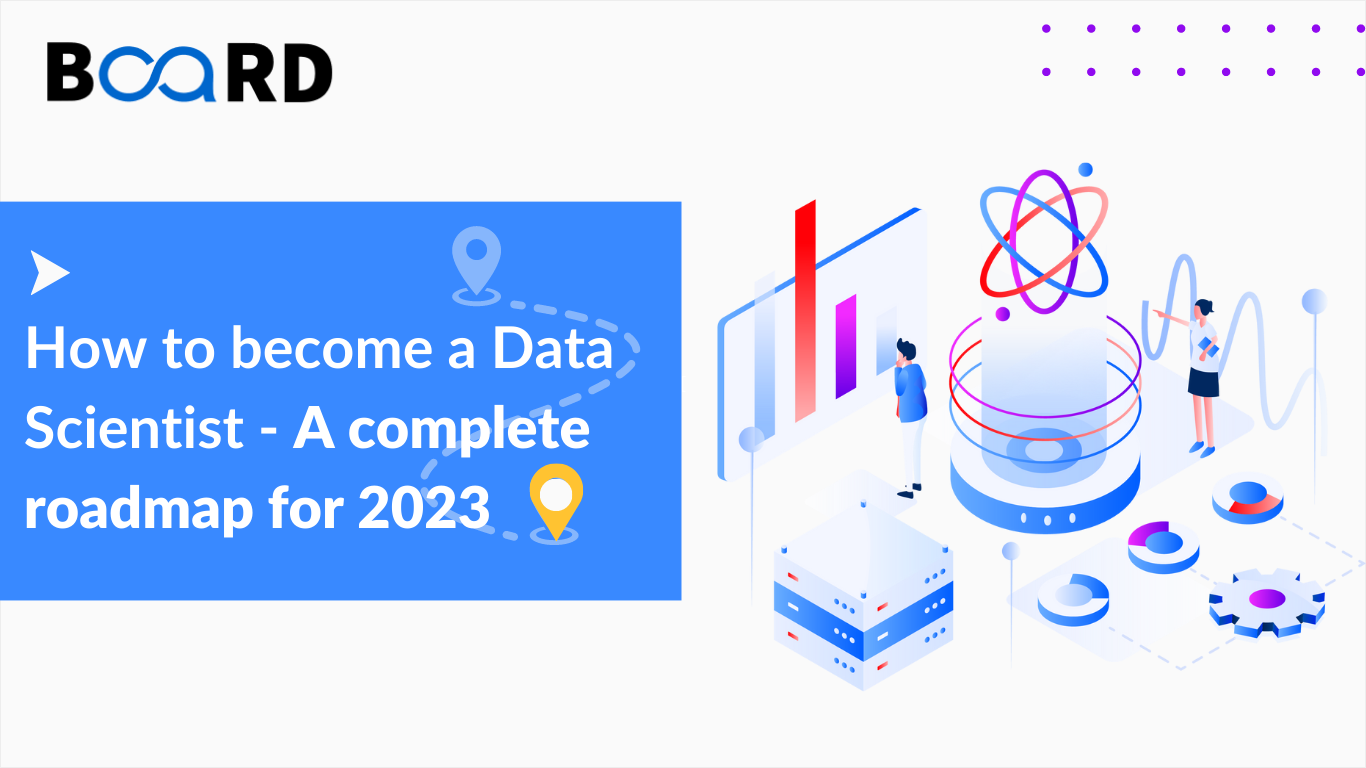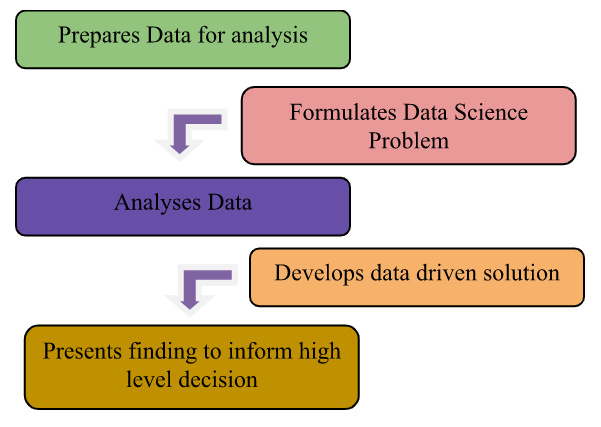Data Science: Career Opportunities and Job Prospects
How to Become a Data Scientist – A Complete Road Map of 2023

Introduction
Data Scientists are skilled professionals who have the ability to solve complex issues based on the gathered data. They should be curiosity-driven and should have an eye for exploring problems that require result-oriented solutions. They showcase a perfect amalgamation of technology with business skills.
Currently, there is a huge demand for skillful Data Scientists to fulfill the increasing demand from the industry. There is a vast amount of unsorted, unstructured data that needs to be addressed which has created a surge in the demand for Data Scientists. So, whether you are starting anew or looking forward to giving that extra boost to your existing career, a Data Science course can help you achieve your goal and accelerate your career on the right path.
What is a Data Scientist?
Data scientists are data wranglers. They use data science to improve their company output by processing a very large amount of complex data and converting it into actionable plans. A data scientist is regarded as a Jack of all trades. A data scientist plays multiple roles such as data collecting, data cleansing, programming, analyzing, optimizing, visualizing, and many more. Typically, a Data Scientist should have a strong background in:

Hence, to become a successful Data Scientist one should be able to combine all these three fields to get a data-driven solution by developing innovative ways to gather and store data. Data scientists are experts in extracting relevant data from the pool of unrefined data and interpreting it using statistical and mathematical skills.
What does a Data Scientist do?
A Data Scientist spends a considerable amount of time processing, cleaning, collecting, and managing unrefined data and converting it into a meaningful database using the required skills and knowledge. A Data Scientist's role requires knowledge of multiple disciplines as it involves a series of calculated actions such as extraction of information from data and interpreting it in meaningful data.
In general a Data Scientist:

What are the skills required to be a Data Scientist?
The process of becoming a Data Scientist involves varied skills including a strong background in mathematics and technology. Additionally, having experience in Machine learning and Statistical modeling, Python, and R programming is beneficial. Although there is no predefined path to becoming a Data Scientist, certain skills before beginning a career as a Data Scientist are always a plus.
A Data Scientist should be able to:
- Acquire, define, manipulate and manage data in a database.
- Build algorithms and design experiments through structured thinking.
- Use machine learning tools to build predictive models and test them.
- Develop excellent programming skills such Python, R, Java, etc,
- Deploy machine learning models and image classification.
- To have a keen eye to be able to identify unstructured data and process it into more meaningful knowledge.
- Establish the relationship between two variables through data visualization and present it graphically.
- Communicate effectively through clear and coherent communication.
- Predict future trends and or forecast adrift based on previous data
Along with the above-mentioned skills, an aspiring Data Scientist should also possess certain soft skills such as problem-solving, Critical thinking, and Teamwork. And finally, one should always be curious as a cat to gain more knowledge.
Eligibility criteria for becoming Data Scientist
Whether you are a newcomer or a professional, a dash of willingness is all it takes to be eligible for becoming a Data Scientist. Data Science is an interdisciplinary field. Be it marketing professionals, software engineers, or IT professionals who are seeking a leap in their career are encouraged to undertake Data Science courses.
- For beginners, it is essential to have obtained a degree in any one of the fields related to science and technology, mathematics, or engineering. Newcomers with a basic knowledge of programming and formal training in the field of Data Science are also a perfect fit to become Data Scientists.
- Data Science is not just limited to engineering or science and technology. Students from business studies or professionals in the business stream such as MBA or BBA can also have a career in Data Science and are eligible for taking up a relevant Data Science module.
- Apart from science and engineering, graduates with a 50% aggregate score can also venture into the Data Science world and build an excellent career in it.
- The criteria are not restricted to Engineers or MBAs, consultants, senior-level management professionals, managers, team leads, entrepreneurs, and business owners too can start or give a push to their existing careers with Data Science.
- And most of all, irrespective of the stream, anyone who is interested in establishing a successful career in the Data Science domain can opt for a relevant degree in Data Science.
How to become a Data Scientist
Once convinced with your choice of career, it is now time to embark on a journey to get your dream job. The demand for Data scientist professionals has surged owing to the need for transforming organizations into faster, better result-oriented businesses. The process of becoming a Data Scientist involves a few simple but very important steps.
Steps involved in becoming a Data Scientist:
1. Obtain your First Degree
The minimum requirement to start your career as a Data Scientist is to obtain a bachelor’s degree preferably in science and technology or engineering field. However, freshers from any stream with an equivalent score can be eligible too.
2. Gain an Understanding of the Domain
Before hopping onto the bandwagon it is very essential to gather the knowledge of the route that needs to be taken. Choosing the correct course with a relevant curriculum, understanding the eligibility criteria, duration of the course is a keys to becoming a successful Data Scientist.
To get a headstart, you can start with the Free Data Science course that aligns with the competency standards developed by SSC NASSCOM and approved by the government of India.
3. Master the Programming Language
Along with the bachelor’s degree, gaining proficiency in programming languages such as python, R, and SQL is a must. They are helpful, especially while working with larger data. Owing to its versatility Python applies to almost all the steps that are involved in the process of data science. Proficiency in SQL helps Data Scientists in accessing and communicating data effectively.
Mastering the programming skills with Python helps in understanding the concept of data wrangling. Coding languages such as C/C++, JavaScript, MATLAB, and SAS are also worth learning along with Scala when dealing with large amounts of data.
4. Develop Relevant Skills
The next milestone while advancing in the career of Data science is to develop more relevant skills as a Data scientist. Typically, a data scientist’s work involves cleaning, sorting, and analyzing large data files. A skillful data scientist should be able to translate data into meaningful visuals using Data visualization. Having adequate knowledge of Machine Learning that includes neural networks, supervised and unsupervised machine learning, and Natural Language Processing will help you stand out from unskilled professionals.
Non-technical skills such as strong communication skills, critical thinking, and problem-solving skills are one of the few skills that are crucial to be a data scientist.
5. Get Verified Certification
Certification is always a great way to showcase skills as a verified Data Scientist. Certification such as Python programming is a great way to build your portfolio when you are seeking a career as a Data Scientist. Mastering the technology with certification in Data Science opens up endless job opportunities for the right candidate.
6. Internships
Once you gain confidence after mastering all the required skills, now it is time to apply those skills in the right direction. There are many ways to achieve hands-on experience. One such way is to enroll in a course that provides placement training and live data science projects e.g Broad Infinity’s Full Stack Data Scientist course.
Subsequently, kick start your career with internships. Despite the huge demand in the field of Data Scientist, candidates often find it challenging to land that dream job they are awaiting. Internships provide opportunities to get hands-on practice to gain knowledge and required experience to set you on the right path of your chosen career. Internship with multiple companies gives that much-needed boost to the candidates’ portfolio.
7. Get ready to Apply
Finally, following all the above crucial steps helps the candidate gain confidence. Prepare an excellent portfolio with certifications and internship awards. And get ready to ace the Data Scientist Interview.
Follow this video, to get a better understanding of a career in Data Science:
Conclusion
In current times, almost every organization requires Data science to analyze, process, and organize a large amount of raw data to make a well-informed result-oriented decision. Data scientists work towards increasing the growth and proficiency of an organization thus making it a profitable organization by applying their analytical, mathematical, and organizational skills. Naturally, this has led to a huge surge in the demand for skillful Data Scientists and is only expected to grow exponentially by 2030. Currently, the demand-to-supply ratio is low and organizations are always on the lookout for Data scientists who stand out amongst the rest.
Although Data Scientists are majorly involved and accountable from start to finish of the project, there are various other areas within Data science such as Data Engineering, Data Architecture, Data Analyst, or Business Analyst which can be chosen according to the required skills and strengths.
